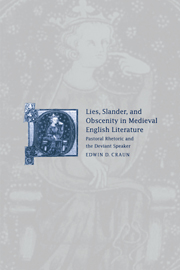 Lies, Slander and Obscenity in Medieval English Literature
Lies, Slander and Obscenity in Medieval English Literature Book contents
- Frontmatter
- Contents
- Acknowledgments
- Note on quotations and translations
- Standard abbreviations
- Introduction
- 1 The pastoral movement and deviant speech: major texts
- 2 The lies of the Fall, the tongues of Pentecost: typing and converting the deviant speaker
- 3 Exemplifying deviant speech: murmur in Patience
- 4 Confessing the deviant speaker: verbal deception in the Confessio Amantis
- 5 Reforming deviant social practices: turpiloquium/scurrilitas in the B Version of Piers Plowman
- 6 Restraining the deviant speaker: Chaucer's Manciple and Parson
- Bibliography
- Index
- CAMBRIDGE STUDIES IN MEDIEVAL LITERATURE
Introduction
Published online by Cambridge University Press: 31 October 2009
- Frontmatter
- Contents
- Acknowledgments
- Note on quotations and translations
- Standard abbreviations
- Introduction
- 1 The pastoral movement and deviant speech: major texts
- 2 The lies of the Fall, the tongues of Pentecost: typing and converting the deviant speaker
- 3 Exemplifying deviant speech: murmur in Patience
- 4 Confessing the deviant speaker: verbal deception in the Confessio Amantis
- 5 Reforming deviant social practices: turpiloquium/scurrilitas in the B Version of Piers Plowman
- 6 Restraining the deviant speaker: Chaucer's Manciple and Parson
- Bibliography
- Index
- CAMBRIDGE STUDIES IN MEDIEVAL LITERATURE
Summary
Early in the fourteenth century, the English priest Robert Mannyng wrote down in his catechetical manual Handlyng Synne the story of a woman who cursed her daughter. As she was preparing to bathe in open country, she gave the child her clothes, bidding her to bring them as soon as she called. When she finished bathing and the child failed to come at her first call, she, “ful of yre and of wraþ,” cursed her child with “þe deuyl come on þe, / For þou art not redy to me.” The devil immediately claimed the child þat þou me betaghte [yielded] wyþ euyl,” manifesting his possession by maddening her on the spot. The literal sense of the woman's words and the malicious fury which generated them gave the devil lifelong power over her child, who, in turn, was given a diabolical power of speech: she exposed the secret sins of everyone whom she encountered.
For Mannyng, the woman's utterance is more than an instance of what J. L. Austin and John Searle would call the performative, of language which does something in the saying, as excommunication was sometimes believed to do. Mannyng's presentation of her speech shares with the speech act theorist interest in utterances as social acts, but it also manifests the late medieval discursive practice, to which priests were especially given, of examining utterances in ethical terms. What does a speaker will?
- Type
- Chapter
- Information
- Lies, Slander and Obscenity in Medieval English LiteraturePastoral Rhetoric and the Deviant Speaker, pp. 1 - 9Publisher: Cambridge University PressPrint publication year: 1997


